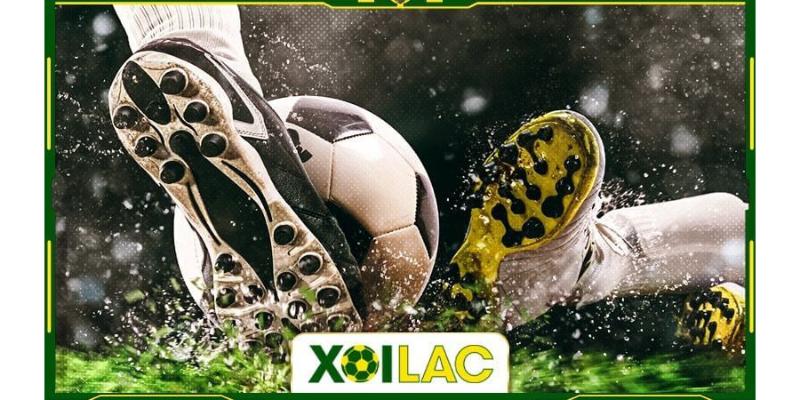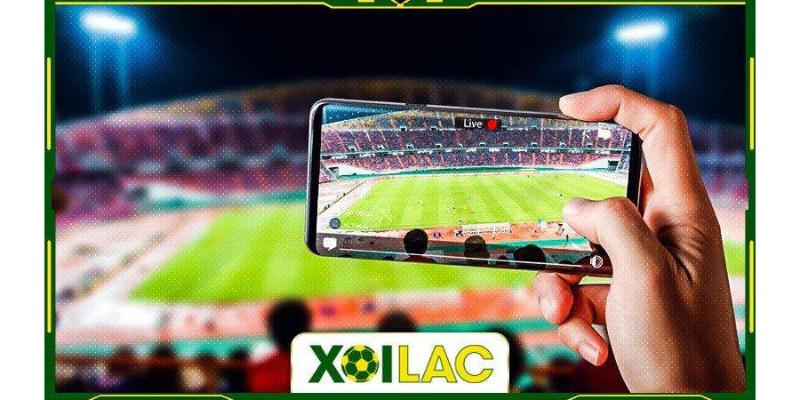Xoilac TV là kênh bóng đá trực tiếp miễn phí chất lượng và uy tín cao. Để hiểu thêm về những lợi ích của kênh bóng đá xoilac tv này mạng lại, hãy cùng xôi lạc tv theo dõi bài viết dưới đây.
Lịch trực tiếp hôm nay tại undergroundmusiccollective.com
Với chất lượng và uy tín, xoilac còn được biết đến là một kênh bóng đá phát sóng trực tiếp hoàn toàn miễn phí. Tại đây, có bình luận viên bằng tiếng không có quảng cáo và hình ảnh full HD chất lượng. Bạn có thể xem trực tiếp các giải đấu lớn nhất tại nhà bằng cách mở kênh bóng đá xoilac và chọn trận đấu mà mình yêu thích để bắt đầu xem.

Giới thiệu tổng quát kênh bóng đá xoilac

Một trong những kênh bóng đá được giới chuyên môn đánh giá cao thì không thể không nhắc đến xoilac. Các thông tin mà nơi đây đăng tải luôn đảm bảo chất lượng cao. Bạn chỉ cần truy cập vào kênh bóng đá này, bạn có thể xem ngay tất cả các giải đấu trong nước và quốc tế.
Kênh xoilac thực tế chỉ vừa mới hoạt động không lâu. Tuy nhiên, kênh phát sóng trực tiếp bóng đá xoilac đã trở nên rất phổ biến với người hâm mộ. Kênh bóng đá dần trở thành địa chỉ đáng tin cậy của fan hâm mộ yêu bóng đá. Bạn có thể yên tâm thưởng thức các trận bóng đá mà mình yêu thích với đường link không chứa virus và an toàn.

Xoilac hiện tại là một trong kênh xem bóng đá trực tuyến được truy cập nhiều nhất mỗi ngày. Kênh trực tiếp bóng đá xoilac tự hào là kênh mang đến cho người dùng chất lượng hình ảnh âm thanh và video full chuẩn HD. Hơn nữa, đây còn là nơi kết nối trái tim của hàng triệu fan yêu bóng đá Việt Nam lại gần nhau hơn.
Mục đích của kênh bóng đá này là cung cấp các liên kết bóng đá chất lượng cao cho bạn. Xoilac còn cung cấp cho người xem những bản tin thể thao cực hot hàng ngày. Nhờ đó người xem không bỏ lỡ bất kỳ thông tin về bóng đá nóng hổi nào.
Những ưu điểm nổi bật làm nên thương hiệu kênh bóng đá xoilac
Kênh bóng đá này là sử dụng công nghệ mới cùng với các chuyên gia hàng đầu tổng hợp tin tức tạo nên thế mạnh vượt trội của kênh này. Chuyên gia sẽ đảm nhận vai trò phát triển hệ thống của kênh và không ngừng nâng cao chất lượng. Ngoài ra, khi truy cập vào đây người xem còn được rất nhiều lợi ích như:
Giao diện được thiết kế dễ sử dụng và ấn tượng
Trước khi bắt đầu ý tưởng thiết kế giao diện xoilac, đội ngũ đầu tư đã nghiên cứu rất nhiều về nhu cầu của người dùng. Từ đó, xây dựng kênh một cách hợp lý và dễ sử dụng. Các danh mục được phân loại từng tính năng, giúp bạn tìm kiếm nhanh chóng và dễ dàng và truy cập thông tin tốt nhất.
Danh mục trực tiếp bóng đá của xoilac còn được trang bị thêm những chức năng hỗ trợ. Người dùng có thể tìm kiếm các trận đấu mà mình muốn và có thể dõi ngay. Giao diện được sử dụng màu sắc chủ đạo hài hòa nhẹ nhàng, nhưng không kém phần nổi bật giao diện của kênh này. Tất cả những điều này sẽ tạo nên nét dấu ấn và đặc sắc riêng trong lòng người dùng xoilac. Hệ thống link xoilac trực tiếp bóng đá sẽ được trình bày riêng biệt rõ ràng và dễ tìm.
Xem bóng đá tại kênh bóng đá xoilac chất lượng cao

Xoilac đã chi rất nhiều tiền để đầu tư vào hệ thống tân tiến nhất, mong muốn mang lại kênh phát sóng trực tiếp chất lượng nhất. Vì vậy khi xem trận đấu, người dùng sẽ được trải nghiệm các ưu điểm sau đây:
- Người dùng có thể dễ dàng chọn đường truyền phù hợp với thiết bị của mình, và cập nhập các trận đấu rất sớm .
- Video được phát sóng có độ phân giải full HD rõ ràng mượt mà và chất lượng. Người dùng có thể xem những chi tiết nhỏ nhất trên sân cỏ.
- Với hình ảnh rõ ràng, dàn âm thanh chân thực giúp người dùng cảm nhận được sự bùng nổ diễn ra sân cỏ.
- Kích cỡ màn hình phù hợp với mọi thiết bị và có thể điều chỉnh phù để người dùng có thể yên tâm trải nghiệm. Người xem có thể điều chỉnh phân giải hình ảnh âm thanh và kích thước màn hình theo nhu cầu của mình.
- Nhiều người nghỉ xem trận đấu dài hơn 120 khá mệt, tuy nhiên đối với kênh bóng đá xoilac người dùng sẽ có những trải nghiệm xem bóng đá thư giãn và chất lượng tốt.
Bình luận viên của kênh bóng đá xoilac vui vẻ và trình độ chuyên môn cao
Nếu không có bình luận viên hỗ trợ, thì một trận bóng vô vị. Đây cũng là lý do xoilac đã đầu mạnh để mời những bình luận viên chuyên nghiệp về hỗ trợ người xem. Ngoài việc theo sát các trận đấu, bình luận viên còn khéo léo chèn những câu nói hài hước vui nhộn. Tất cả những điều này đều mang lại cho người dùng trải nghiệm xem bóng đá thoải mái vui vẻ.

Tìm kiếm thông tin dễ dàng tại kênh bóng đá xoilac
Xoilac giúp người dùng dễ dàng tìm kiếm thông tin về các trận đấu đang diễn ra. Điều này giúp cho bạn nhanh chóng thu thập thông tin về các trận mà đội bóng tham gia thông qua kênh này. Điểm đặc biệt của kênh bóng đá này là không giới hạn số lần xem trực tuyến, bạn có thể thỏa sức tận hưởng các trận đấu bóng đá ở mọi lúc mọi nơi.
Xoilac không chỉ cung cấp trận đầu phát sóng trực tiếp mà còn cập nhật nhiều thông tin quan trọng có liên quan đến cho bạn như: lịch thi đấu, kết quả trận đấu, bảng xếp hạng, trình trạng các cầu thủ chấn thương và các cầu sẽ ra sân…Cùng với đó là những giải đấu lớn như: giải Ngoại hạng Anh, Cúp C1, La Liga và World Cup.
Xoilac cũng có một đội chuyên gia giàu kinh nghiệm để đưa ra những nhận định bóng đá chính xác về các trận đấu sắp được diễn ra. Điều này cho phép bạn phân tích những thay đổi về tỷ lệ cược của các trận đấu bóng đá sắp tới.
Xem bóng đá trực tuyến tại kênh bóng đá xoilac dễ dàng với nhiều thiết bị

Xoilac được thiết kế rất hiện đại, ứng dụng của kênh bóng đá tương thích với nhiều loại thiết bị. Mục đích của xoilac là để thỏa mãn nhu cầu của người dùng khi xem trực tuyến bóng đá. Bạn có thể truy cập xoilac từ các thiết bị như: điện thoại, máy tính PC, laptop hay máy tính bảng.
Kênh bóng đá còn được tối ưu hóa để sử dụng với trình duyệt web như: Google Chrome, Cốc Cốc, Mozilla Firefox, Microsoft Edge và Safari…Bạn cũng có thể tải ứng dụng trên hệ điều hành như: Android và iOS. Sự đa dạng này giúp cho việc xem trực tiếp bóng đá trở nên dễ dàng và thuận tiện hơn.
Đội ngũ nhân viên xoilac hỗ trợ chuyên nghiệp với người dùng
Đội ngũ nhân viên chăm sóc khách hàng của xoilac được tuyển chọn kỹ lưỡng và qua lớp đào tạo bài bản. Nhờ đó bộ phận chăm sóc khách có thể phản hồi chính xác và nhanh chóng mọi tình huống hoặc câu hỏi liên quan đến kênh bóng đá xoilac. Đội ngũ nhân viên này có thể hỗ trợ cho bạn với nhiều ngôn ngữ. Hơn hết thời gian làm việc 24/7 sẽ đáp ứng mọi nhu cầu của bạn.
Kết luận
Hy vọng rằng những thông tin mà chúng tôi chia sẻ chi tiết về xoilac ở bài viết trên, sẽ giúp cho bạn có thêm nhiều niềm tin về kênh bóng đá uy tín chất lượng này. Các giải đấu lớn trên toàn thế giới đang sắp được diễn ra, bạn nên truy cập vào ngay xoilac để có những giây phút trải nghiệm thư giãn đam mê bóng đá của mình.




